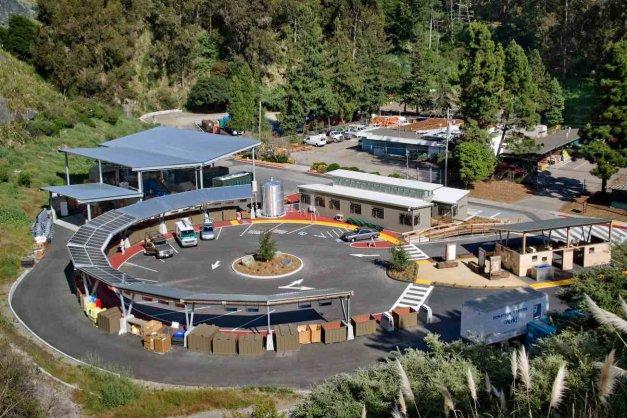California Cities Use Creative Approaches to Recycling
Waste reduction and recycling are essential elements of a sustainable community. Local residents, businesses and public agencies alike benefit from conserving resources, protecting the environment, reducing waste and finding new uses for recycled materials. As California residents and businesses increase the amount of material they recycle, local governments seek ways to build additional recycling infrastructure facilities and expand existing programs.
El Cerrito’s Recycling Resource Center Serves as a Showcase
The City of El Cerrito has built a Recycling Resource Center that showcases the value of recycling and environmental responsibility. The center not only provides residents a place to recycle a wide range of conventional and hard-to-recycle items, but also serves as the environmental heart of the city. It accepts 28 recyclable materials, including Styrofoam, a material most recyclers do not take. The center also accepts prescription drugs to keep them from polluting landfills and waterways, through a program paid for by the East Bay Municipal Utility District.
An average of 400 customers visit the center each day to recycle or reuse products, participate in educational classes or just to enjoy the site’s features. The center’s sustainable elements include solar panels, an 11,000-gallon rainwater reservoir, native landscaping, rain gardens that filter stormwater runoff and extensive energy efficiency measures.
Oceanside Capitalizes on Compost
The City of Oceanside in northern San Diego County recognized early that traditional methods of green waste disposal, such as open burning or landfilling, are inefficient and environmentally unsound. In an effort to develop a more environmentally and economically sustainable waste-management approach, the city partnered with a recycling and compost facility operator to develop a beneficial public-private recycling program.
Since its inception, the compost facility has processed over 1.5 million tons of green waste, primarily from within the city, and transformed it into high quality soil amendments, mulch and potting mixes. These products are sold to homeowners, landscapers, farmers, golf courses and public works departments and offered free to Oceanside residents. This public-private partnership model demonstrates that what can be good for the planet can also be good for the economy and the community.
ILG’s Recycling Resource Center Offers Helpful Information
In an effort to assist local governments in recycling efforts, the Institute for Local Government recently launched an online Recycling Resource Center in partnership with the California Department of Resources Recycling and Recovery, also known as CalRecycle. The resource center offers a variety of documents, webinars and case examples to help local governments finance, site and operate residential and commercial recycling projects and programs in their communities.
Topics and materials provided by the Recycling Resource Center include:
- An explanation of the connections between recycling, greenhouse gas emissions and economic development;
- Options for financing recycling programs and facilities;
- Essential facts about recycling facilities and required permits;
- California Environmental Quality Act guidelines for recycling infrastructure projects;
- Tips on streamlining the planning process for recycling facilities; and
- Information on permitting and financing anaerobic digestion facilities.
To access the resource center and read more about the projects described here, visit www.ca-ilg.org/recycling-resource-center.
Photo credit: David Wakely Noll and Tam Architects, courtesy of the Institute for Local Government
This article appears in the February 2016 issue of
Western City
Did you like what you read here? Subscribe to Western City

